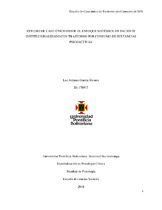| dc.contributor.advisor | Méndez Moreno, Lina Patricia | |
| dc.contributor.author | García Álvarez, Luz Adriana | |
| dc.coverage.temporal | 2019 | |
| dc.date.accessioned | 2020-09-29T15:58:56Z | |
| dc.date.available | 2020-09-29T15:58:56Z | |
| dc.date.issued | 2019 | |
| dc.identifier.uri | http://hdl.handle.net/20.500.11912/6111 | |
| dc.description | 59 páginas | spa |
| dc.description.abstract | El presente trabajo tiene como objetivo describir el proceso de acompañamiento desde el enfoque sistémico de un paciente consumidor de sustancias psicoactivas institucionalizado. El proceso constó de cuatro fases: exploración de la dinámica familiar, evaluación, comprensión del problema e intervención psicológica, desarrolladas en nueve sesiones. Se utilizaron instrumentos tales como entrevista sistémica, genograma y la Escala de Satisfacción Familiar ESFA. Algunas técnicas sistémicas implementadas fueron: redefinición del síntoma, connotación positiva, devolución sistémica, bloqueo de interacciones negativas y promoción de interacciones saludables. Resultados: se identificaron pautas disfuncionales en la dinámica familiar. En cuanto al instrumento ESFA, se obtuvieron puntuaciones que indicaban muy baja satisfacción familiar. Respecto al proceso de intervención, se resalta el enganche de la familia al proceso, la redefinición del rol del paciente al interior del sistema y la comunicación clara entre sus integrantes con el fin de prevenir recaídas. El proceso no tuvo cierre ni seguimiento terapéutico debido al cese del funcionamiento institucional. | spa |
| dc.description.abstract | This work describes the process of accompaniment from systemic approach of a patient who consumes psychoactive substances institutionalized. The process consisted in four phases: exploration of family dynamics, evaluation, understanding the problem and psychological intervention, developed in nine sessions. Instruments such as systemic interview, genogram and the ESFA Family Satisfaction Scale were used. Some systemic techniques implemented were: redefinition of the symptom, positive connotation, systemic devolution, blocking of negative interactions and promotion of healthy interactions. Results: dysfunctional patterns in family dynamics were identified. As for the ESFA instrument, scores were obtained that indicated very low family satisfaction. Regarding the intervention process, the family's attachment to the process, the redefinition of the patient's role within the system and the clear communication among its members in order to prevent relapse are highlighted. The process had no closure or therapeutic follow-up due to the cessation of institutional functioning. | eng |
| dc.format.mimetype | application/pdf | |
| dc.language.iso | spa | |
| dc.publisher | Universidad Pontificia Bolivariana | spa |
| dc.rights | Attribution-NonCommercial-NoDerivatives 4.0 International | * |
| dc.rights.uri | http://creativecommons.org/licenses/by-nc-nd/4.0/ | * |
| dc.title | Estudio de caso único desde el enfoque sistémico en paciente institucionalizado con trastorno por consumo de sustancias psicoactivas -- Bucaramanga | spa |
| dc.type | Especialización | spa |
| dc.publisher.department | Escuela de Ciencias Sociales | spa |
| dc.publisher.program | Especialización en Psicología Clínica | spa |
| dc.type.hasVersion | publishedVersion | spa |
| dc.description.sectional | Bucaramanga | spa |
| dc.description.degreename | Especialista en Psicología Clínica | spa |


